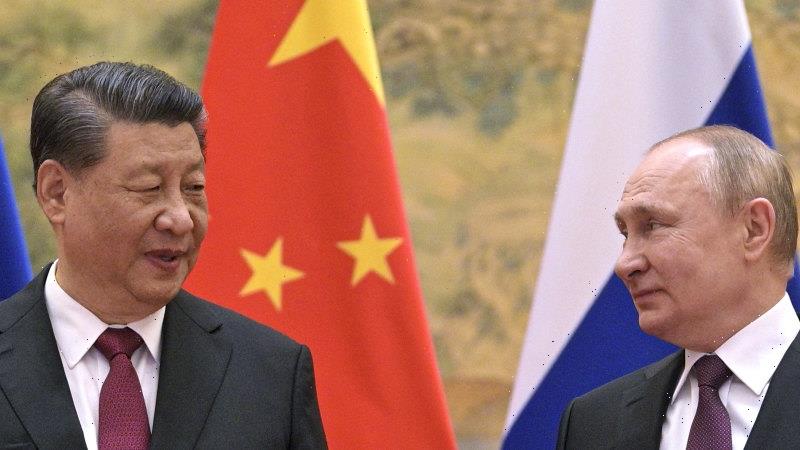When China joined the World Trade Organisation in 2001, its GDP was about $1.8 trillion. Last year, it was more than $US24 trillion. No country has benefited more from a globalised world in which trade has expanded faster than at any time in history on the back of relative peace among the great powers.
The invasion of Ukraine by Russian President Vladimir Putin has brought that era of peace to a sudden and bloody end, and given new life to the Cold War divisions of the 20th century. That has put Chinese President Xi Jinping in a very precarious position. For while Beijing’s two main trading partners, by a good margin, are the United States and the European Union, it finds itself diplomatically and ideologically aligned with Russia. That alliance was cemented last month, when Mr Putin and Mr Xi signed a new agreement as the Winter Olympics kicked off in Beijing in which they declared that their two countries’ relationship had “no limits”.
China is in an awkward position when it comes to the war in Ukraine.Credit:AP
As a consequence, as The Age’s China correspondent Eryk Bagshaw has pointed out, China finds itself veering between condemning international sanctions on Russia and calling for Ukraine’s territorial integrity to be respected. China has positioned itself as the Eastern ballast to alleged Western overreach, while watching with increasing alarm both the brutality of Russia’s invasion and the international response to it.
It is a position that China may find increasingly hard to navigate. By failing to deter the invasion, and then staying largely silent as it proceeds, Mr Xi may prove himself a good friend of Mr Putin but lose credibility as a global leader, and damage ties with Beijing’s most important economic partners.
Ukraine itself is a sizeable trading partner with China, with more than $20 billion in bilateral trade in 2020. But much more is at stake for China in this conflict. America and the European Union are already scrambling to wean themselves off their reliance on Russian oil and gas. If China’s support of Russia prompts other nations, particularly in Europe, to seek ways to reduce their reliance on the trading giant, it could further slow an economy already facing sizeable headwinds. It should also not be forgotten that while Mr Putin may wield a big stick in global affairs with a potent military force he is more than willing to use, he resides over an economy that is significantly smaller than any other major power and 10 times smaller than China’s.
But for all the pitfalls China may face in coming days, there are also potential upsides. The growing threat of Russia in Europe will inevitably stall America’s strategic switch to the Indo-Pacific region to contain China’s expansionary goals in the region. However, even that gain may not be all it seems. While there is legitimate concern that a successful takeover of Ukraine by Russia could encourage China to realise its ambitions with Taiwan, Mr Putin’s bloody but stuttering campaign is hardly turning into an ideal playbook for Mr Xi to follow.
In China’s latest efforts to mitigate the fallout from its ally’s actions in the Ukraine war, Foreign Minister Wang Yi has offered to mediate peace talks between Kyiv and Moscow and agreed to send medical supplies to Ukraine. But Mr Wang had not a bad word for Mr Putin and his increasingly deadly attacks on Ukrainian citizens.
That falls well short of a credible position for China. Mr Putin’s invasion of Ukraine has dramatically changed the landscape of security in Europe and well beyond. It has put on full display the bloody actions of an authoritarian government willing to use historical grievances to quash a liberal democratic nation. There should be no middle ground when it comes to condemning such actions.
Gay Alcorn sends an exclusive newsletter to subscribers each week. Sign up to receive her Note from the Editor.
Most Viewed in World
Source: Read Full Article






